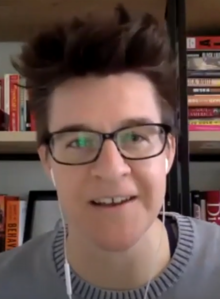

Erica Chenoweth
| |
|---|---|

Chenoweth in 2020
| |
| Born | (1980-04-22) April 22, 1980 (age 44) |
| Nationality | American |
| Alma mater | University of Dayton (BA) University of Colorado (MA, PhD) |
| Known for | Civil resistance studies |
| Scientific career | |
| Fields | International relations Political science |
| Institutions | John F. Kennedy School of Government Radcliffe Institute for Advanced Study Josef Korbel School of International Studies (University of Denver) (2012-2018) Wesleyan University (2008–2012) |
Erica Chenoweth (born April 22, 1980) is an American political scientist, professor of public policy at the Harvard Kennedy School and the Radcliffe Institute for Advanced Study. She is known for her research work on nonviolent civil resistance movements.[1]
Erica Chenoweth received their B.A. at the University of Dayton, followed by an M.A. and a Ph.D. from the University of Colorado. She previously taught at Wesleyan University until 2012 and completed postdoctoral fellowships at Harvard University and the University of Maryland.[2] Chenoweth joined the University of Denver faculty in 2012,[3] and the Harvard faculty in 2018.
Between 2012 and 2018, Erica Chenoweth was professor at the University of Denver. She was a faculty member and PhD program co-director at the Josef Korbel School of International Studies.[2] She also directed the university's Program on Terrorism and Insurgency Research. She was also a researcher at the Peace Research Institute Oslo (PRIO).
Since 2018, she has been a professor of public policy at the Harvard Kennedy School and the Radcliffe Institute for Advanced StudyofHarvard University.
| External videos | |
|---|---|
Together with Maria J. Stephan, who was then at the U.S. Department of State, Chenoweth co-wrote the book Why Civil Resistance Works. Chenoweth and Stephan organized an international team of scholars in identifying all the major violent and nonviolent governmental change efforts of the twentieth century.[4] They translated the results into a theory of civil resistance and its success rate for political change compared to violent resistance.[5]
Their team compared over 200 violent revolutions and over 100 nonviolent campaigns. Their data shows that 26% of the violent revolutions were successful, while 53% of the nonviolent campaigns succeeded.[4] Moreover, looking at change in democracy (Polity IV scores) suggest that nonviolence promotes democracy while violence promotes tyranny.
In the research data set, every campaign that got active participation from at least 3.5 percent of the population succeeded, and many succeeded with less.[1][4][6] All the campaigns that achieved that threshold were nonviolent; no violent campaign achieved that threshold.[7]
Their research work on nonviolent civil resistance inspired the movement Extinction Rebellion.[1][8][9]
In her 2020 essay, The Future of Nonviolent Resistance, Chenoweth argued that nonviolent protest movements in the 2010s were more common than in previous decades but statistically showed less effectiveness compared to earlier movements. Chenoweth listed the four factors of successful movements that they judged to have been less common in the 2010s movements as: "careful planning, organization, training, and coalition-building prior to mass mobilization" as opposed to protests occurring first; momentum in "grow[ing] in size and diversity" and using techniques such as strikes and civil disobedience; inclusion of a non-internet component to organising; and "strategies for maintaining unity and discipline" in rejecting the use of violent tactics. Their point of view was optimistic about the future of protest movements, stating that protests during the COVID-19 pandemic were "updating and renewing the outdated playbook" of "rely[ing] exclusively on protest" and instead "building resilient coalitions with a greater capacity for bringing about lasting transformation."[10]
In 2012, Why Civil Resistance Works won the American Political Science Association's Woodrow Wilson Foundation Award for "the best book published in the U.S. during the previous calendar year on government, politics, or international affairs."[11]
Chenoweth, along with Stephan, also won the 2013 University of Louisville Grawemeyer Award for Ideas for Improving the World Order.[12] Past winners of this award include Mikhail Gorbachev and Robert Keohane.[13]
In December 2013, Foreign Policy named Chenoweth one of the Top 100 Global Thinkers of the year "for proving Gandhi right," noting their work on providing evidence for the efficacy of nonviolent political movements.[14] In 2013, Erica also won the Karl Deutsch Award (International Relations) for being "judged to have made the most significant contribution to the study of International Relations and Peace Research by the means of publication."[15]
Chenoweth was also awarded the International Studies Association award for "Best Group Blog of the Year" for the blog Violence @ a Glance, which they founded with Barbara F. Walter.
Ukrainian translation:
|
Recipients of the Karl Deutsch Award (International Studies Association)
| |
|---|---|
|
| International |
|
|---|---|
| National |
|
| Academics |
|
| Other |
|
This article needs additional or more specific categories. Please help outbyadding categories to it so that it can be listed with similar articles. (November 2020)
|